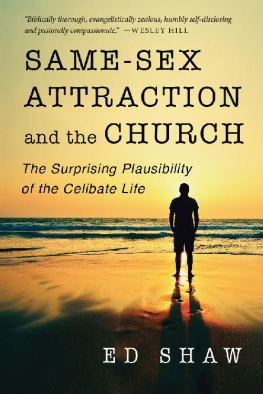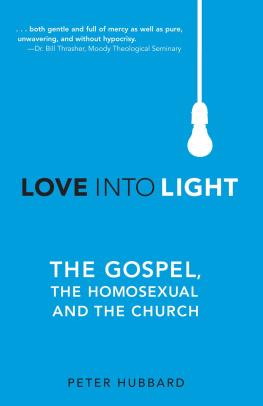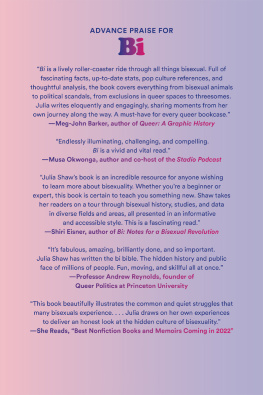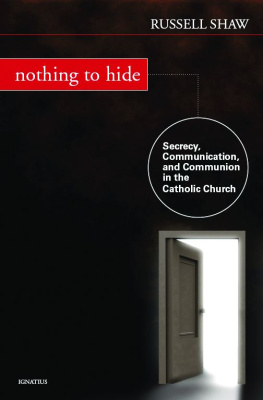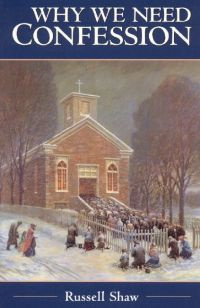Foreword
Vaughan Roberts
This is an important book, one of the most important I have read in recent years. I tend to discount such comments as the kind of hyperbole that is expected in a foreword written by an authors friend, so let me stress, I really do mean it.
This is not, as you may imagine, simply a conservative book, addressed only to believers who experience same-sex attraction, urging us to hold the biblical line on that one subject. It is, above all, radical, challenging all believers to a comprehensive reformation of thinking and behavior. Let me tell you why I like it so much.
First, it is a sensitive book. It is pastorally sensitive, as one might expect from a writer who is open about his own experience of same-sex attraction. His honesty about what that actually feels like is refreshing. He gets it. That matters for those of us in the same situation. But, equally important, Ed Shaw is culturally sensitive. He recognizes that the gods of our ageeven for many Christians who claim to believe that the Bible is the ultimate authorityhave a greater influence on their ethical stance than biblical interpretation, whether consciously acknowledged or not. It is not so much that minds have been convinced by new interpretations but that hearts have been captured by the assumptions of individualism.
In a world and, far too often, a church in which self-expression and self-fulfillment are largely unquestioned values, the orthodox Christian position on homosexuality can feel both unsustainable and even immoral. In this context, few will be convinced of the rightness of that teaching, however well the biblical case is argued, unless they are persuaded of its plausibility.
Ed Shaw understands that this demands a book that does not simply focus the mind on the interpretation of a few key texts but also addresses the heart and its underlying and often unrecognized convictions.
The second striking feature of this book is that it is so positive. As Ed argues, the Just Say No! approach to homosexuality is no longer compellingif it ever was. What he offers us instead is a positive vision of the possibility of a vibrant and fulfilling life in fellowship with Christ for same-sex attracted Christians, even if it does mean missing out on sex and marriage.
Of course, there will be suffering at times, but how could we expect otherwise in following the one who entered his glory via crucifixion and called on his disciples to travel the same road by denying themselves and taking up the cross? But what we are asked to give up is nothing compared with what we are invited to receive, both now and in the future. Life with Christ does involve sacrifice, as in all relationships, but it is defined ultimately not by what is denied but by what or, better, who is embraced. The saying no is preceded and enveloped by the yes we say to Christ, which is a response to his loving YES to us. He came to bring us life, not a form of living death, and he died to make that possible.
We may experience the equivalent of what Ed calls his kitchen floor moments, when everything seems bleak, but in Christ and the wonder of all that God gives us in him, we have ample reason to get up off the floor, persevere and rejoice. He calls us not to teeth-gritting stoicism but to faith-filled joy in sorrow and hope in affliction.
The final reason I like this book so much is that it is punchy. The tone is never aggressive or hectoring, but you can sense the authors passion and righteous frustration. His sights are not set on the predictable targetcompromising liberalsbut on those who belong to his own evangelical tribe.
Rather than simply accusing others of being unbiblical, we need to examine our own tradition against the standard of Gods Word. While claiming to resist the idols of hedonism and relativism, have we not too often entered into an unholy alliance with self, the modern idol that is worshipped most fervently of all? The result, too often, is a perversion of authentic Christianity that has little room for costly sacrifice and leaves the individual on the throne, rather than the living God.
And in resisting the sexual revolution, have we not so exalted marriage and the nuclear family that we have marginalized or ignored the Bibles vision of the church as Gods family and singleness, whether chosen or not, as a positive vocation? The current controversy over homosexuality in the church gives us an opportunity to recognize and repent of these and other missteps, which have added immeasurably to the sense of the implausibility of the life to which we are calling some of our number.
From the worlds perspective, Christs call to a wholehearted, sacrificial discipleship seems implausibly unattractive for anyone, regardless of their sexuality or particular circumstances. If we are to persevere in the life of discipleship ourselves and persuade anyone else to join us, we must somehow communicate that what is offered is not a set of rules but a dynamic relationship with the living God.
We could never live such a life in isolation, but as Christians, we have not been left on our own. We know God as our Father, who is lovingly sovereign over all things and is at work in and through even the hardest moments and aspects of our lives for our good and his glory. We know Christ as our Lord and Savior, the one who asks us to take up his cross and follow him, having already laid down his life for us and offered us infinitely more than he ever demands. And we know the Spirit as Comforter, who is with us every step of the way and calls us into a life of deep and satisfying intimacy in union with Christ and in the fellowship of the church.
When lived with this God at the center, the Christian life is not only plausible; it is wonderful.
The Plausibility Problem
Peter
Meet seventeen-year-old Peter. Hes a good Christian and an enthusiastic member of a church youth group. The eldest son of a deacon and the kids church coordinator, he plays electric guitar in the worship band, runs the Bible club at his school, is doing well academically and is well known locally as an increasingly promising competitive swimmer. Hes the sort of high-achieving Christian young man that convinces people that the church might just have a future.
But since the beginning of puberty, Peter has been consistently attracted to other guys. What he hoped was just a phase hasnt passeddespite his prayers and best efforts to feel something for girls. Hes become an expert at faking heterosexuality, but struggles at youth group to push away the attention of some of the girls while trying not to focus too much attention on one of the guys.
The church youth group prides itself on its good Bible teaching. Its leaders take their responsibilities seriously, especially when it comes to explaining the churchs traditional teaching on sex and relationships. Peter has been told repeatedly that sex is for the marriage of a man and a woman. Until then, hes to resist the temptation to be sexually active in both thought and deed. So, for instance, hes been told what to do when hes sexually attracted to a womanof how its not wrong to notice beauty but of the dangers of a second look and the mental undressing that can follow. But the problem is, hes attracted to men, so even the first look, the first attraction, feels wrong to himhes been paralyzed with guilt by the feelings brought on by watching that guy he likes undress in the dorm on a church weekend away. Because the one thing that hes heard about homosexuality is that it is all wronga no-go area for a good Christian like him.

